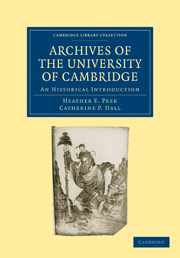Book contents
- Frontmatter
- Contents
- List of Plates
- Preface
- PART I
- PART II
- 4 The University and Colleges as Privileged Corporations
- 5 Records of University Administration
- 6 Records of Matriculation and Degrees
- 7 Financial Records of the University
- 8 Endowments of the University
- 9 University Officers and their Records
- 10 Records of the University Courts
- 11 Records of University Jurisdiction in the Town of Cambridge
- 12 The Relations between the Crown and the University
- 13 Other University Institutions and their Records
- APPENDICES
- Index
- Index to Muniments of Title in Appendix B
- Plate section
4 - The University and Colleges as Privileged Corporations
Published online by Cambridge University Press: 07 September 2010
- Frontmatter
- Contents
- List of Plates
- Preface
- PART I
- PART II
- 4 The University and Colleges as Privileged Corporations
- 5 Records of University Administration
- 6 Records of Matriculation and Degrees
- 7 Financial Records of the University
- 8 Endowments of the University
- 9 University Officers and their Records
- 10 Records of the University Courts
- 11 Records of University Jurisdiction in the Town of Cambridge
- 12 The Relations between the Crown and the University
- 13 Other University Institutions and their Records
- APPENDICES
- Index
- Index to Muniments of Title in Appendix B
- Plate section
Summary
University and colleges, being alike autonomous, corporate bodies, have, as their corporate designation, either ‘the Chancellor, Masters and Scholars of the University or ‘the Master, Fellows and Scholars’ of the college. Each, therefore, has its own constitution and corpus of statutes, its own officials and servants, its own property and revenues. Each is the custodian of its own charters of privilege, title-deeds, and administrative records. Certain classes of documents will therefore be common to both university and colleges and, indeed, to most ancient corporations. Of these, the early charters and statutes are particularly important, in that they determine the nature of the university and colleges as privileged corporations.
CHARTERS OF PRIVILEGE
In a college muniment room, the most valued of the ancient charters is usually the foundation charter. The university differs from the colleges in having no such document and, indeed, no known founder. The university does not even possess the first authentic recognition of its existence by the crown, a small writ of 1231, concerning the rents of houses of scholars, which is recorded in the Close Rolls. The earliest surviving document in the university archives is a letters patent of 1266, on the same subject, the first in the existing series of royal privileges granted to the university. The vicissitudes of fortune suffered by the university's early muniments have left them a less impressive collection than that of the sister university of Oxford or those of many institutions of comparable antiquity.
- Type
- Chapter
- Information
- Archives of the University of CambridgeAn Historical Introduction, pp. 24 - 27Publisher: Cambridge University PressPrint publication year: 1963First published in: 1962



